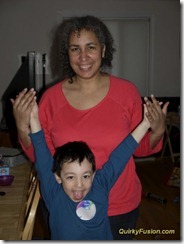 I’m biracial. I love being biracial. I love dancing in different worlds, being unique, leaving strangers wondering. I’m entertained by the many ways people try to ascertain my racial makeup, some with rude frankness and others with a subtlety so profound that I’m not even sure what they’re asking. It wasn’t always this way. There was a time – many times – when I was unhappy with my background and the color of my skin.
I’m biracial. I love being biracial. I love dancing in different worlds, being unique, leaving strangers wondering. I’m entertained by the many ways people try to ascertain my racial makeup, some with rude frankness and others with a subtlety so profound that I’m not even sure what they’re asking. It wasn’t always this way. There was a time – many times – when I was unhappy with my background and the color of my skin.
My biological father, who was black, was barely in my life. I grew up with my white mother and, when she remarried, an entire white family. It was a white neighborhood (and no, not predominantly white… just white) and school, and I clearly stood out. It made me self-conscious. It made me different. And it made me really uncomfortable.
It took me a long time to grow comfortable with and then proud of my own skin (literally). It took ages for me to get past a feeling of not being black – or white – enough. Whether you realize it or not, people place expectations on you the moment they see you. Being bi-racial means a broader set of expectations because people aren’t quite sure what box to place you in. Do I speak Spanish? (Nope) Am I a great dancer? ( Hardly) Do I come from some fabulously exotic location? (Absolutely not) You can safely assume that whatever you expect from me upon seeing me is not what I’m going to deliver. I’m not going to speak, act, believe, or dream in whatever manner you’d expect. It’s one of my super powers. And now, instead of feeling less because I don’t fall into some norm, I revel in it. My site isn’t called Quirky Fusion for nothing.
And now I have kids. Since my husband is also white, my kids aren’t sporting much of my color. I am sometimes a bit saddened by this because I don’t want them growing up forgetting part of their heritage. It’s important to me and a source of pride. On the other hand, I’ve assumed that perhaps they’ll find their lives to be a bit easier without a question mark over their heads. I was wrong.
What I didn’t realize was that quite a bit of my angst growing up was less about being biracial and more about the idea that I didn’t “look like” my mom. In reality, I looked just like my mom if you can get past the color of our skin, but I didn’t see that. I just felt different from the person who mattered to me most.
Bug, who is five, is starting to notice things like this and has become a bit obsessed. He doesn’t seem to notice or care that his skin is a shade or two darker than his dad’s. What he notices, and has become quite concerned with, is that his skin is much lighter than mine. When I comment on his tan, he anxiously asks if he’s going to be as brown as me. He holds his arm up to mine and drops it in disappointment when the coloring still doesn’t match. When he’s tired and frustrated, he insists that he doesn’t fit in our family. And I know that the color of our skin is partly behind his feeling.
I explain to him that we’re all different; each one of us is a different shade in the spectrum of our family. No one of us has the same coloring as another. I tell him that he completes our family and we couldn’t be happy without him there. But behind it all, my heart is breaking for my sensitive little guy.




I’m having some of these same fears for my son son. He def notices the difference between our skin-tones. So far he seems to accept we’re difference but connected. Still I wonder internally how he’s working it all out. Hope both our sons find a way to accept and celebrate being biracial.
Thanks for your comment. I was so unprepared for this particular challenge. You just never know what your kids are going to see in a situation!
Since I am the “mom” in this case, Christy, reading your blog gives more insight into the child I raised and all your thoughts growing up. I worried about you also, just like you worry about Bug. I’m sure that being biracial definitely gives one a sense of being different from others. But, the feeling of being different from those in your family runs through most of our lives to a variety of degrees. Example, I know people who are teased about “the milkman’s visits” because they were unique in their families. Many kids experience the thought they might have been adopted at some point in their lives. I think the process of growing includes becoming comfortable with your uniqueness AND your commonality with your family and humanity in general.
[…] great pieces on racism: Parenting Tip – Open Up by Soulseeds and Parenting Challenges: Race, Color, Identity and the Need to Belong by Christy at QuirkyFusion. Both amazing pieces to read about race and family and parenting, even […]
I totally agree that it is more looking like mom than anything. I am an adoptive “peach” mom of two girls from Ethiopia who are “brown”. I forget that our skin color doesn’t match, but when we get introduced to new situations I become aware of how uncomfortable the girls can be with introductions. It would make life easier if we “matched” but who said life was going to be easy!
My family is the way you described yours growingup…I am the “light” mom, and my oldest daughter was born of my relationship with her “dark” dad, our relationship didn’t work out and I am now married to a “light” man and my daughter has two little light siblings.
My daughter and I have talked a lot about this because like you describe, she sometimes is sad that she doesn’t look like me :-( and I put a lot of energy into explaining she is perfect the way she is, and that if she wasn’t the way she is she simply wouldn’t be her.
I’m very conscious about keeping her around diversity, which is a challenge sometimes since we moved from living across the street from the most diverse zip code in the country a few weeks ago. Most of her best friends have a similar back ground of having parents that are different colors.
There aren’t many pictures of her dad or dad’s family unfortunately, though I have asked for them many many times. I think at some point I’m just going to have to head back east to NYC with her and a camera to take our own pictures, I do wish there were more from her dad’s past too though.
Anyway, thanks for writing about this!
Oh, honey. Like you, my father is black and absent, my mother is white and raised me by herself in an entirely white family. I know exactly what you mean about not quite being white enough, or black enough, to belong with anyone. Like you, finding myself was a bit of a journey.
I married a light-skinned bi-racial man and have two children. Not one of us has quite the same skin colour. When my children ask, I tell them that is just the way we are made. I tell them that there are no two people in the whole wide world who look exactly the same. Like you, I hope that will be enough to keep them lifted. It is my dearest hope that when it comes time for them to figure out who they are, the colour of their skin won’t matter.
The diversity in our family comes from international adoption. I have a daughter from Guatemala, a daughter from Russia…with two parents that are Northern European muts. I never gave the color of my skin much thought until a very tiny brown skinned, black eyed, brown haired child came into our lives.
Now I worry about how she feels. How is her difference making her feel? Are people judging us? Wondering how this beautiful Hispanic child has a blond haired, blue eyed mother.
Maybe I just need to stop worrying. She is my daughter. We are a family. We love each other.
First off, I love that your mom commented on this post, how great is that?! Second, I am the only mixed race child of my parents and my older siblings are white. I, too, felt out of place in spite of the fact that I look just like my mom. That is oddly enough what began the acceptance, when people stopped asking if I was adopted (and irritating my mother) and began asking if she was my mom. Watching them look at our faces & work it out helped, because it added levity and finally people were seeing the real us. Thanks for sharing your story.